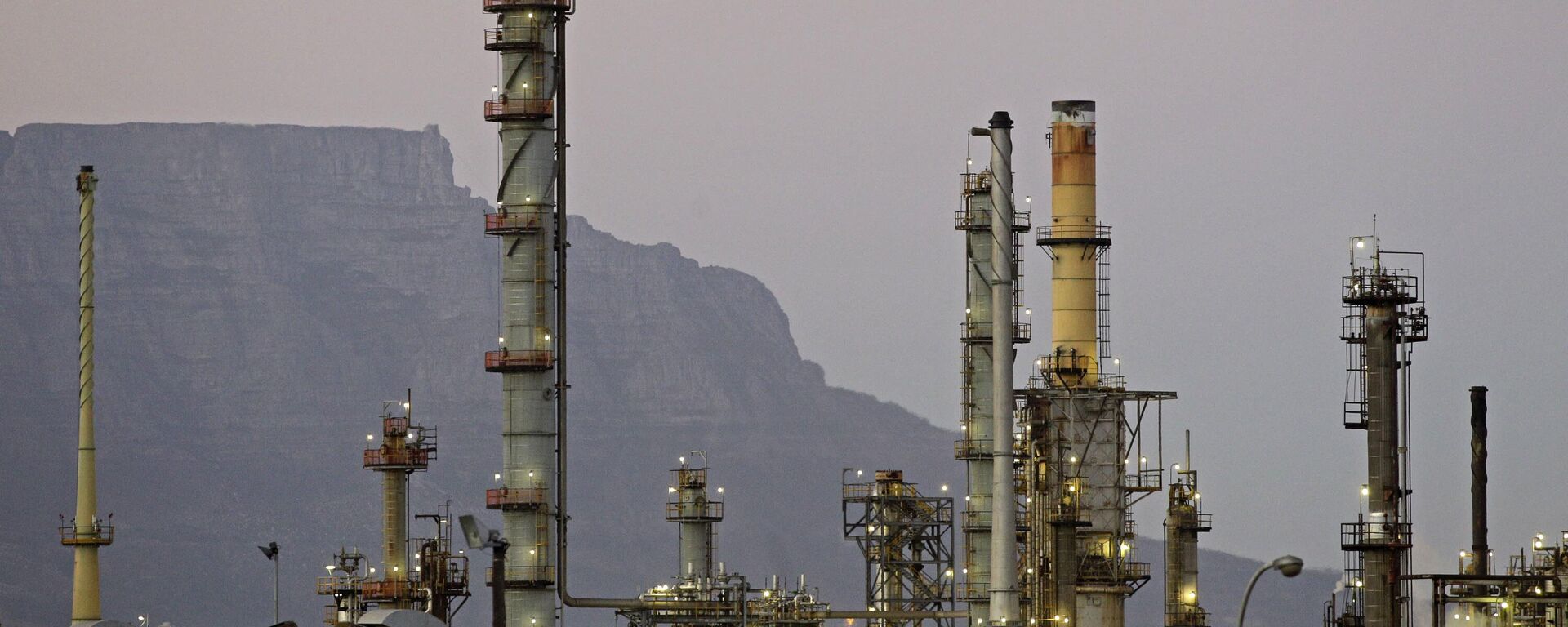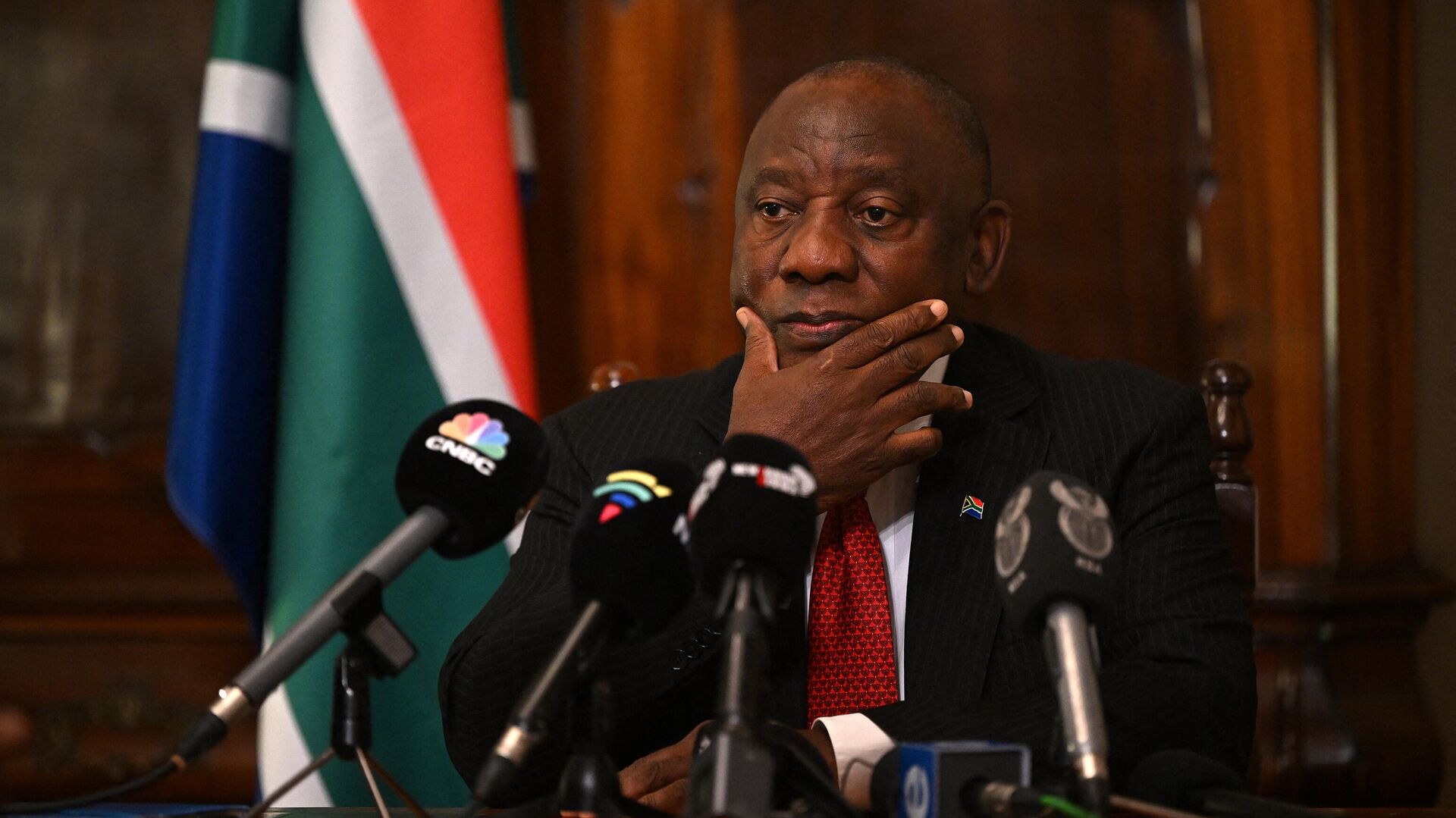https://sputnikglobe.com/20230210/south-africa-declares-state-of-disaster-amid-electricity-crisis-president-states-1107288615.html
South Africa Declares 'State of Disaster' Amid Electricity Crisis
South Africa Declares 'State of Disaster' Amid Electricity Crisis
Sputnik International
South African President Cyril Ramaphosa on Thursday declared "a national state of disaster" to overcome the electricity crisis gripping his country.
2023-02-10T06:45+0000
2023-02-10T06:45+0000
2023-02-14T14:09+0000
africa
south africa
southern africa
electricity
ramaphosa
cyril ramaphosa
energy crisis
president
https://cdn1.img.sputnikglobe.com/img/07e6/0c/01/1104926621_0:157:3085:1892_1920x0_80_0_0_bbd2175b035d552f9e748bbd7bd313ef.jpg
"Our most immediate priority is to restore energy security. We are in the grip of a profound energy crisis, the seeds of which were planted many years ago ... The National Disaster Management Center has consequently classified the energy crisis and its impact as a disaster. We are therefore declaring a national state of disaster to respond to the electricity crisis and its effects," Ramaphosa said in his annual State of the Nation address to parliament.The president noted that the state of emergency decree has already been published in the official gazette and will take effect immediately. Ramaphosa said the state of disaster regime would allow the government to take a series of practical measures to support businesses, food storage and retail, as well as the deployment of generators and solar panels to ensure an uninterrupted power supply.The president added that he would appoint a minister of electricity in the presidency, who would "assume full responsibility for overseeing all aspects of the electricity crisis response."Ramaphosa also announced the development of a mechanism to provide the most vulnerable South Africans with targeted basic income support.Other announced measures include the use of the Covid-19 "bounce back" loan scheme in order to fund the development of solar power as well as additional funding for ESKOM to purchase diesel to produce electricity.Ramaphosa noted that critical infrastructure – for instance, water treatment plans and hospitals – would not face load shedding.The country has been struggling with power shortages, leading to rounds of load shedding, or rolling blackouts, since 2007, but the energy crisis worsened recently. Since November, South Africa has been facing daily power outages at peak times, which hinder the economic growth of the country and interfere with every part of people's daily lives.The state of disaster was last declared in South Africa in 2020, during the early stage of the COVID-19 pandemic, in order to enable swift response by health authorities.
https://sputnikglobe.com/20230202/south-africas-national-oil-firm-reportedly-seeks-partners-to-revive-defunct-refinery-1106922115.html
africa
south africa
southern africa
Sputnik International
feedback@sputniknews.com
+74956456601
MIA „Rossiya Segodnya“
2023
Sputnik International
feedback@sputniknews.com
+74956456601
MIA „Rossiya Segodnya“
News
en_EN
Sputnik International
feedback@sputniknews.com
+74956456601
MIA „Rossiya Segodnya“
Sputnik International
feedback@sputniknews.com
+74956456601
MIA „Rossiya Segodnya“
africa disaster, ramaphosa disaster, south africa, ramaphosa speech, ramaphosa address, africa energy
africa disaster, ramaphosa disaster, south africa, ramaphosa speech, ramaphosa address, africa energy
South Africa Declares 'State of Disaster' Amid Electricity Crisis
06:45 GMT 10.02.2023 (Updated: 14:09 GMT 14.02.2023) MOSCOW (Sputnik) – South African President Cyril Ramaphosa on Thursday declared "a national state of disaster" to overcome the electricity crisis gripping his country.
"Our most immediate priority is to restore energy security. We are in the grip of a profound energy crisis, the seeds of which were planted many years ago ... The National Disaster Management Center has consequently classified the energy crisis and its impact as a disaster. We are therefore declaring a national state of disaster to respond to the electricity crisis and its effects,"
Ramaphosa said in his annual State of the Nation address to parliament.
The president noted that the state of emergency decree has already been published in the official gazette and will take effect immediately.
Ramaphosa said the state of disaster regime would allow the government to take a series of practical measures to support businesses, food storage and retail, as well as the deployment of generators and solar panels to ensure an uninterrupted power supply.
The president added that he would appoint a minister of electricity in the presidency, who would "assume full responsibility for overseeing all aspects of the electricity crisis response."
"The minister will focus full-time and work with the ESKOM [state electricity provider] board and management on ending load shedding and ensuring that the energy action plan is implemented without delay," the leader noted.
Ramaphosa also announced the development of a mechanism to provide the most vulnerable South Africans with targeted basic income support.

2 February 2023, 12:43 GMT
Other announced measures include the use of the Covid-19 "bounce back" loan scheme in order to fund the development of solar power as well as additional funding for ESKOM to purchase diesel to produce electricity.
Ramaphosa noted that critical infrastructure – for instance, water treatment plans and hospitals – would not face load shedding.
The country has been struggling with power shortages, leading to rounds of load shedding, or rolling blackouts, since 2007, but the
energy crisis worsened recently. Since November, South Africa has been facing daily power outages at peak times, which hinder the economic growth of the country and interfere with every part of people's daily lives.
The state of disaster was last declared in South Africa in 2020, during the early stage of the COVID-19 pandemic, in order to enable swift response by health authorities.



